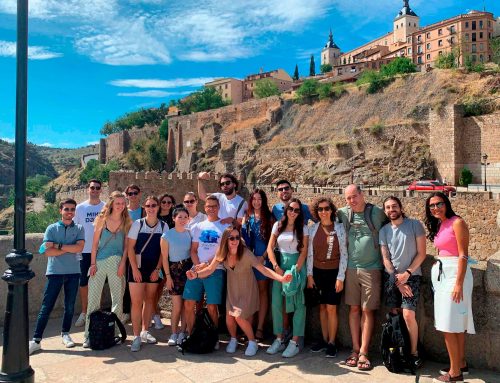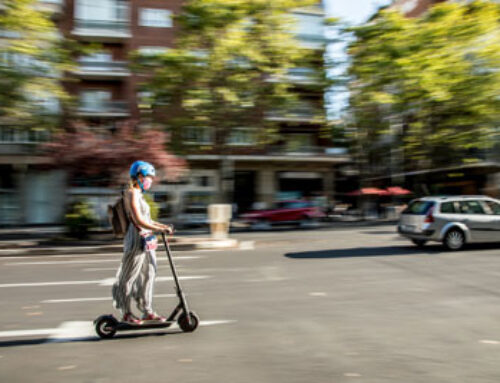Travelling to Spain for a Spanish course in times of Covid-19, yes or no?
We all have been living in a situation of great uncertainty for more than a year. The coronavirus has changed everyone’s life, forcing us to accept limitations and restrictions that we were previously unaware of. Years ago, when we wanted to go on holiday, all we had to do was to find a free period and book a trip on a website. Now travelling to a foreign country is much more difficult. You have to look up the different countries’ entry requirements as well as those of your own country for your return. In fact, the most difficult thing is to dare to travel in these uncertain times.
Personally, I was faced with the same dilemma. On the one hand, I wanted to travel to Madrid, discover the city, practice the language, improve my Spanish and live in a wonderful country. On the other hand, the German Foreign Office discouraged avoidable trips to Spain. I spent many sleepless nights thinking about the arguments for and against staying in Spain. I finally decided to travel, despite the high number of infections. Now that I am in Madrid, I can say that it was a good decision. With this text I want to tell you why I felt and still feel safe here, and perhaps make it easier for you to make the decision to travel to Spain.
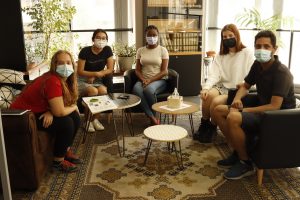
-
The trip
Before entering Spain, you have to fill out a health declaration stating that you have not had any symptoms of Covid and that you have not had contact with an infected person in the last 14 days. The document is checked at the airport in your home country as well as in Spain and entry is prohibited without this declaration. In this way, the government tries to ensure that no one travels to Spain while infected. In addition, at the airport and on the plane, the use of face masks is mandatory, safety distance and hygiene instructions are observed, and disinfectant tissues are distributed. These measures are intended to prevent travellers from becoming infected. In the metro they ask for the same measures to be followed.
- In Madrid
Currently, the cumulative incidence of cases in 7 days in Madrid is slightly higher than in my home country, Germany. The use of masks inside buildings is compulsory, while in the street it is voluntary. However, many people on the streets wear them, showing that they take the current situation seriously. The pandemic affected and is still affecting the country, which can be seen in the care of Madrileños for their health and that of others. Everywhere there are disinfection gels and they ask to comply with safety measures. In Spain, more than 70% of the population has been fully vaccinated and even foreigners are offered vaccination to prevent the spread of the virus. In the city you feel safe from the virus.
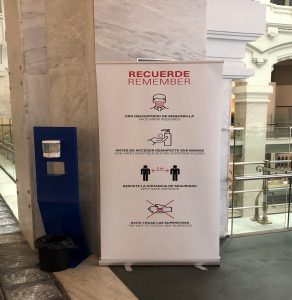
3. At school
Inhispania also asks for compliance with all safety measures. The use of masks is compulsory at all times, even for teachers. Every Monday there is a welcome meeting in which new students are informed about safety and hygiene measures. In addition, as a reminder, there is a sheet of paper with the measures at the entrance of all classrooms. It is also possible for the school to measure the temperature of the students to ensure that it is not too high, checks are arbitrary and unannounced. Here, both the staff and all pupils take illness and the rules to be respected seriously. Furthermore, Inhispania has been accredited as a safe ELE school.
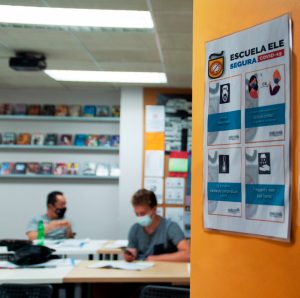
In conclusion, I can say that the decision I made was the right one. We always have to keep in mind that we live in a difficult situation to travel and live our lives as we used to do before. However, everyone knows that we are facing a disease that can cause damage to our bodies. Thanks to health measures and prudent people, I feel safe living in Madrid and working in Inhispania. To all of you who are thinking of coming to Spain to study, I would advise you to dare and do it. For me there is only one answer to the question at the beginning: Yes!





